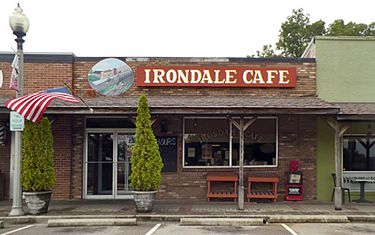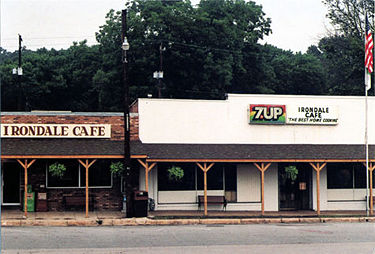Irondale Cafe: Difference between revisions
m (Typo) |
No edit summary |
||
| (4 intermediate revisions by 2 users not shown) | |||
| Line 1: | Line 1: | ||
[[Image:Irondale Cafe.jpg|right|thumb|375px|Irondale Cafe in 2010]] | |||
[[Image:Irondale Cafe 1990s.jpg|right|thumb|375px|1990s postcard view of the Irondale Cafe]] | |||
[[Image:Irondale Cafe typical meat and three.jpg|right|thumb|375px|Typical meal complete with the famous fried green tomatoes at center.]] | |||
'''Irondale Café''' is located at 1906 [[1st Avenue North Irondale|1st Avenue North]] in [[Irondale]]. | '''Irondale Café''' is located at 1906 [[1st Avenue North Irondale|1st Avenue North]] in [[Irondale]]. | ||
The restaurant began as [[Emmett Montgomery]]'s hot dog stand in [[1928]]. He was joined by [[Maggie Prentice]] who expanded the menu with barbecue, hamburgers and other sandwiches. [[Bess Fortenberry]] purchased the business in [[1932]] and converted it into a home style restaurant as the Irondale Café. She leased it out in order to join the war effort in the early 1940s. When she returned after [[World War II|the war]], she brought her friend [[Sue Lovelace]] and a cook, [[Lizzie Cunningham]] back to Irondale to help run the cafe. Though small, the café prospered by selling sandwiches to railroad workers to take with them. | The restaurant began as [[Emmett Montgomery]]'s hot dog stand in [[1928]]. He was joined by [[Maggie Prentice]] who expanded the menu with barbecue, hamburgers and other sandwiches. [[Bess Fortenberry]] purchased the business in [[1932]] and converted it into a home style restaurant as the Irondale Café. She leased it out in order to join the war effort in the early 1940s. When she returned after [[World War II|the war]], she brought her friend [[Sue Lovelace]] and a cook, [[Lizzie Cunningham]] back to Irondale to help run the cafe. Though small, the café prospered by selling sandwiches to railroad workers to take with them. | ||
In December [[1972]], after Fortenberry had suffered a stroke, former railroad worker [[Billy McMichael]] and his wife [[Mary Jo McMichael|Mary Jo]] purchased the 31-seat restaurant, reopening on [[January 2]], [[1973]]. In [[1979]] the café building was demolished and rebuilt on the same site to meet health department requirements and to allow for expansion. It reopened with 100 seats on [[July 22]], [[1980]]. | In December [[1972]], after Fortenberry had suffered a stroke, former railroad worker [[Billy McMichael]] and his wife [[Mary Jo McMichael|Mary Jo]] purchased the 31-seat restaurant, reopening on [[January 2]], [[1973]]. In [[1979]] the café building was demolished and rebuilt on the same site to meet health department requirements and to allow for expansion. It reopened with 100 seats on [[July 22]], [[1980]]. In December [[1990]] the dining area was expanded into an adjoining space which had housed the [[Daly Hardware Store]], creating a total capacity of 300 diners. | ||
The Irondale Cafe was the inspiration for the [[1987]] novel ''Fried Green Tomatoes at the Whistle Stop Café'', which was adapted into a screenplay for the film ''Fried Green Tomatoes''. Author [[Fannie Flagg]] was Fortenberry's grandniece and she adapted numerous real-life stories from the café's history for her book. The popularity of the book and film brought new customers from all over as well as a sudden high demand for fried green tomatoes. To keep up with demand, a batter suitable for deep frying was developed. | The Irondale Cafe was the inspiration for the [[1987]] novel ''Fried Green Tomatoes at the Whistle Stop Café'', which was adapted into a screenplay for the film ''Fried Green Tomatoes''. Author [[Fannie Flagg]] was Fortenberry's grandniece and she adapted numerous real-life stories from the café's history for her book. The popularity of the book and film brought new customers from all over as well as a sudden high demand for fried green tomatoes. To keep up with demand, a batter suitable for deep frying was developed. | ||
In June [[2000]] the | In June [[2000]] the McMichaels sold the café to [[Jim Dolan]] while keeping the rights to the name for marketing batter mixes, seasonings and other products. [[Billy McMichael Jr]] currently runs [[WhistleStop Products]]. Dolan obtained a liquor license as part of plans to offer a cooked-to-order evening menu in April [[2012]]. | ||
Besides fried green | Besides fried green tomatoes, Irondale Café is known for its chicken and dumplings, fried chicken, and other Southern staples. | ||
==References== | ==References== | ||
* Fullman, Lynn Grisard (December 28, 2009) "[http://blog.al.com/living-news/2009/12/a_review_of_favorite_recipes_f.html A review of favorite recipes from Birmingham area restaurants]." | * Fullman, Lynn Grisard (December 28, 2009) "[http://blog.al.com/living-news/2009/12/a_review_of_favorite_recipes_f.html A review of favorite recipes from Birmingham area restaurants]." {{BN}} | ||
* | * Coman, Victoria L. (April 18, 2012) "Irondale Cafe gets liquor license." {{BN}} | ||
==External links== | ==External links== | ||
Latest revision as of 11:17, 17 October 2016
Irondale Café is located at 1906 1st Avenue North in Irondale.
The restaurant began as Emmett Montgomery's hot dog stand in 1928. He was joined by Maggie Prentice who expanded the menu with barbecue, hamburgers and other sandwiches. Bess Fortenberry purchased the business in 1932 and converted it into a home style restaurant as the Irondale Café. She leased it out in order to join the war effort in the early 1940s. When she returned after the war, she brought her friend Sue Lovelace and a cook, Lizzie Cunningham back to Irondale to help run the cafe. Though small, the café prospered by selling sandwiches to railroad workers to take with them.
In December 1972, after Fortenberry had suffered a stroke, former railroad worker Billy McMichael and his wife Mary Jo purchased the 31-seat restaurant, reopening on January 2, 1973. In 1979 the café building was demolished and rebuilt on the same site to meet health department requirements and to allow for expansion. It reopened with 100 seats on July 22, 1980. In December 1990 the dining area was expanded into an adjoining space which had housed the Daly Hardware Store, creating a total capacity of 300 diners.
The Irondale Cafe was the inspiration for the 1987 novel Fried Green Tomatoes at the Whistle Stop Café, which was adapted into a screenplay for the film Fried Green Tomatoes. Author Fannie Flagg was Fortenberry's grandniece and she adapted numerous real-life stories from the café's history for her book. The popularity of the book and film brought new customers from all over as well as a sudden high demand for fried green tomatoes. To keep up with demand, a batter suitable for deep frying was developed.
In June 2000 the McMichaels sold the café to Jim Dolan while keeping the rights to the name for marketing batter mixes, seasonings and other products. Billy McMichael Jr currently runs WhistleStop Products. Dolan obtained a liquor license as part of plans to offer a cooked-to-order evening menu in April 2012.
Besides fried green tomatoes, Irondale Café is known for its chicken and dumplings, fried chicken, and other Southern staples.
References
- Fullman, Lynn Grisard (December 28, 2009) "A review of favorite recipes from Birmingham area restaurants." The Birmingham News
- Coman, Victoria L. (April 18, 2012) "Irondale Cafe gets liquor license." The Birmingham News
External links
- Irondale Café website


